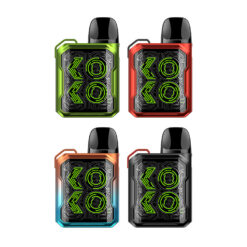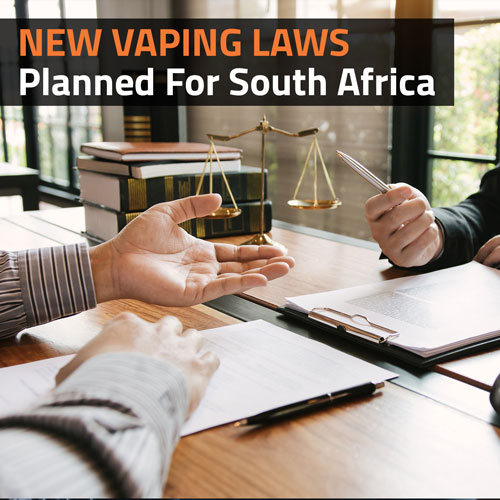Vaping Laws in South Africa are about to change. These laws are to be implemented in order to boost regulations on devices and vaping related products for both consumers and businesses. So where exactly are these Vaping Laws going to take us, and what does this mean for vape users, non-vape users and distributors alike? Here is all the information we currently have on the proposed instalment of new Vaping Laws.
Current Vaping Guidelines and Regulations
The South African Bureau of Standards (SABS) has moved towards creating a National Technical Committee (TC) to assist them in the development of South African National Standards relating to the use of vaping products and e-cigarettes. These new regulations will be introduced through the Control of Tobacco Products and Electronic Delivery Systems Bill, and the new implementation of taxes on vaping products.
There are currently no regulations enforced regarding the production or distribution of vape-related devices and products in South Africa. This means that the SABS will be responsible for creating brand-new guidelines and standardizations within the field. This will influence electronic vaping products as well as their components and liquids.
Which guidelines will SABS implement?
SABS has stated that they will focus on creating guidelines on the following aspects of vaping:
- Sampling
- Terminology
- Testing and analysis methods
- Product specifications
- Quality management
- Distribution methods and availability
- Promotion of safety
- Requirements for packaging, transportation, and storage
Why Is There A Need For Vaping Laws and Guidelines?
Vaping has become increasingly popular in South Africa and its participation in the economy is extremely prominent. It has been established that around 350 000 people in South Africa are currently using vaping products. This has amounted to an estimate of roughly R1.25 billion made through product sales in 2019 alone.
Since the vaping industry is growing so rapidly, SABS has stated that there is a need for national standards to guide the production and distribution of high quality vaping products. Consumers need to be assured that their vaping devices and products are in fact safe for use.
Youth Initiation
As vaping has become more popular, it has attracted many new users. The largest age groups that are currently partaking in the use of vaping products include teenagers and young adults between the ages of 18 – 29. Many teens that have taken up vaping report to be non-smokers and are doing it to be part of a social culture.
The new vaping bill is not aimed at banning vaping devices and products for adults. It is largely aimed at minimising the use of e-cigarettes among non-smoking youth. This will be done by the regulation of advertising and the management of areas where these products can be used and sold.
A Focus on Non-Tobacco and Tobacco Products
SABS has chosen to focus on non-tobacco and tobacco-related vaping products. The Department of Health has reportedly drafted a bill regarding the control of tobacco products and has a newer electronic delivery systems policy that is undergoing public enquiry. Thus, the SABS aims to focus on vaping products while taking the inclusion of this drafted bill into consideration, since the standards are voluntary in nature.
Plans for the hosting of a first technical committee meeting regarding the nature of new laws are currently underway. The TC aims to review existing regional and international guidelines, research, standards, policies, and other related documents to develop suitable voluntary national standards to be implemented in South Africa.
-
Sale Product on sale
 UWELL Caliburn GK2 Kit
UWELL Caliburn GK2 KitR495.00Original price was: R495.00.R247.50Current price is: R247.50.Rated 5.00 out of 5 based on 3 customer ratings
Public Input
Once the TC has reached a consensus, the bill will move to a stage of public enquiry. During this stage, members of the public will be allowed to comment on the proposed standards and submit their input. These comments will be taken into account during the next stage of developing the bill into a national standard.
How long will the process take?
It takes about 300 days to develop a new national standard, but the duration will ultimately depend on:
- The commitment and availability of the TC
- The availability of published documents and research on electronic vaping devices
- Whether the TC reaches a communal conclusion
- Involvement during the stage of public enquiry
Tax Implications
The government aims to introduce a new tax law regarding vaping products. Information regarding this tax law is still unclear as it is not yet readily available, and is subject to change as the TC does more extensive research.
The proposed tax will be implemented at a minimum of R2.90 per millilitre of e-liquid. This will be implemented from 1 January 2023 provided that the drafted bill has reached a state of approval.
There will be a specific tax placed upon both nicotine and non-nicotine solutions that are used within vaping liquids. It is proposed that an incidence guideline of 40% will be used. This translates to a total excise duty within the range of R33.33 to R346.00, with the average amount being R165.29.
If this approach is followed, the excise rate can be set at an average of R2.91 per millilitre on nicotine and non-nicotine elements within the solution. This is based on a ratio of 70:30, so a rate of R2.03 per milligram of nicotine-based elements and 87 cents per millilitre of the liquid components that do not contain nicotine.
The higher ratio for nicotine will ensure that products with high nicotine levels will impose a relatively higher rate when compared to products that contain less nicotine. However, this proposal does not necessarily support the governmental policy intention to reduce the consumption of tobacco-related products.
Implications for vaping
New tax implications could potentially stimulate illicit trading in the realm of e-cigarettes and vaping, just as it has done before in the tobacco sector. It could also push more people to keep smoking traditional cigarettes instead of making the healthier switch to vaping.
The government is currently arguing for the regulation of vaping and e-cigarette products, since these products can be considered as harmful. But vaping innovations are aimed at reducing the harm of traditional tobacco products and mitigating the impact combustible tobacco products have on a users’ health.
Heavy regulation could lead to excessive costs, which could in turn lead to using alternatives and creating an opposite effect. This is a probability that SABS will have to take in consideration when determining the objective of implementing these tax implications.
As with any new laws produced within a certain sector, the implementation of laws regarding vaping will affect a number of individuals and businesses. Companies that sell e-liquids will likely have to increase their prices in order to keep up with new taxation expenses, which could affect their business. Users that prefer liquids that do not contain nicotine will still see a price increase in their products, but those who prefer liquids that contain nicotine will notice a more significant price change. This could also urge some consumers to move away from vaping products and turn to traditional cigarettes or illegitimate vaping products, which would have an intensely negative health impact. There is also the possibility that vaping in public spaces and non-designated smoking areas may become prohibited due to the fact that vapes may contain nicotine.
At Vaperite, we encourage a safe and healthy vaping experience. We also aim to enlighten those who are vaping or those who want to switch from traditional cigarettes about the practice. We have a wide range of reputable vaping devices and high-quality e-liquids for users to choose from to ensure safe and informed vaping practices.






